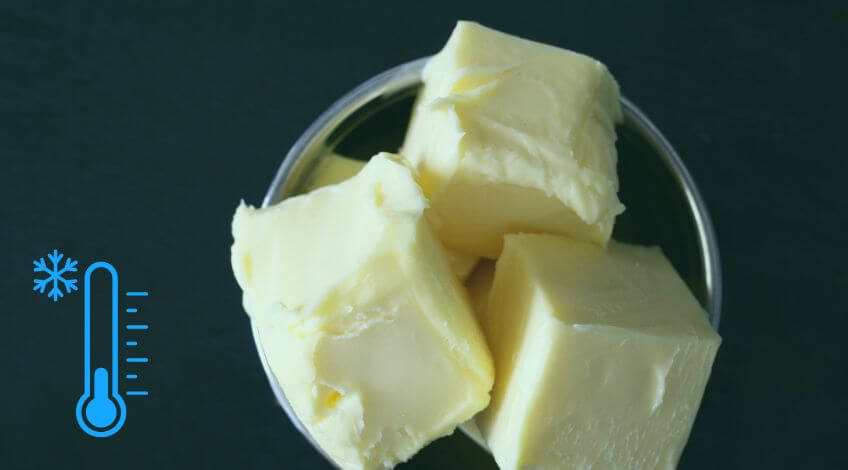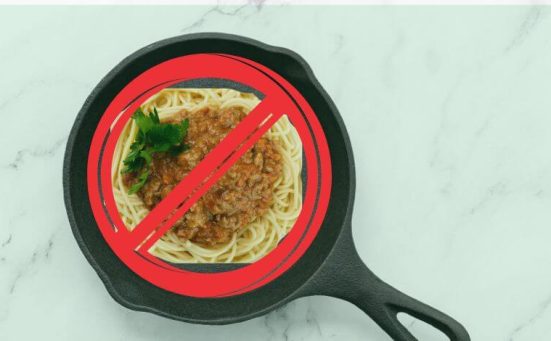
This Is What Actually Happens When You Freeze Butter (And Why It Matters)
Wondering if that stack of butter you bought on special offer can go in the freezer?
Whether you’re someone who stocks up during sales, a busy person who wants ingredients ready when inspiration strikes, or simply looking to make your groceries last longer, knowing the ins and outs of butter freezing will revolutionise your kitchen habits.
Let’s cut straight to the chase: yes, you absolutely can freeze butter, and doing so won’t ruin its texture or flavour when thawed properly. In fact, it’s one of the easiest foods to freeze successfully!
What Happens When You Freeze Butter
When you place butter in the freezer, the water molecules inside slow down and crystallise, while the fat molecules become more solid. This process happens without damaging the butter’s structure, which is why it thaws beautifully compared to many other dairy products.
For those who buy butter in bulk when it’s on sale, this is brilliant news! Your bargain butter won’t go to waste, and you’ll always have some ready for those weekend baking sessions or unexpected guests.
How The Freezing Process Preserves Butter
Freezing essentially puts butter in suspended animation. When temperatures drop below 0°C, bacterial growth halts completely, which means your butter stays fresh far beyond its refrigerator life. The solid fat structure of butter also helps it maintain its integrity during freezing, unlike dairy products with higher water content that can separate when frozen.
This is particularly useful if you’re someone who doesn’t use butter regularly. Rather than watching it gradually deteriorate in your fridge, you can portion it out and freeze what you won’t use within a few weeks.
Why Different Butters Freeze Differently
Not all butter is created equal, and this affects how it freezes. Butter with higher fat content, such as European style or cultured butter, tends to freeze exceptionally well because it contains less water to form potentially disruptive ice crystals.
For those who invest in premium butter when it’s on offer, this is fantastic news: your luxury butter will maintain its quality beautifully in the freezer.
Best Practices For Freezing Butter
Freezing butter is straightforward, but a few simple techniques can make all the difference between butter that thaws perfectly and butter that picks up freezer odours or develops freezer burn.
Keep Butter In Its Original Packaging
The simplest method is to pop unopened butter directly into the freezer in its original wrapper. The paper or foil wrapping that butter comes in is actually designed to protect it from air and moisture, making it naturally freezer friendly.

For those who stock up during sales, this couldn’t be easier: simply transfer your butter haul directly from shopping bag to freezer!
Add Extra Protection For Longer Storage
If you’re planning to store butter for more than a month, consider adding an extra layer of protection. Slip the wrapped butter into a resealable freezer bag or wrap it in aluminium foil to prevent freezer burn and stop it from absorbing odours from other foods.
This extra step takes just seconds but makes a huge difference for long term storage, especially for those who like to keep a rotating stock of butter in the freezer.
Portion Before Freezing For Convenience
One of the cleverest approaches is to cut sticks of butter into tablespoon sized portions before freezing. This means you can thaw exactly what you need for a recipe without defrosting an entire block.
For occasional cooks, this is a game changer: no more watching half used butter blocks gradually yellow in your fridge after you’ve made that one special recipe!
How Long Can You Keep Butter In The Freezer?
Knowing the storage lifespan of frozen butter helps you maximise its quality and prevent waste. The good news is that butter has an impressive freezer life compared to many other dairy products.
Salted Butter: Up To 12 Months
Salted butter is the champion of freezer storage, lasting up to a full year when properly wrapped. The salt acts as an additional preservative, keeping the butter tasting fresh even after extended freezing.
This makes salted butter the ideal choice for those stocking up during sales, as you can truly buy a year’s worth without worrying about quality loss.
Unsalted Butter: Up To 6 Months
Unsalted butter has a shorter freezer lifespan of about six months. Without salt’s preservative qualities, it’s more susceptible to developing off flavours over extended storage periods.
For bakers who prefer unsalted butter for its pure taste and precise chemistry in recipes, this means you’ll want to rotate your frozen stock more frequently.
How To Tell If Frozen Butter Has Gone Bad?
Even with proper storage, it’s good to know the signs that frozen butter has passed its prime. Look for discolouration, unusual odours, or an off taste after thawing. If the butter has developed freezer burn (dry, discoloured patches), you may want to discard it or use it for cooking rather than spreading.
This knowledge is particularly valuable for those committed to reducing food waste, as it helps you use your butter while it’s still at its best.
Thawing Butter Properly For Best Results
The way you thaw frozen butter can significantly impact its texture and usability. Different methods suit different timelines and intended uses.
The Refrigerator Method: Best For Most Uses
For general purposes, simply transfer frozen butter from freezer to refrigerator and let it thaw gradually overnight or for about 6 to 7 hours. This slow thawing maintains the butter’s emulsion and texture perfectly.
This method is ideal for those who plan meals ahead and can anticipate when they’ll need butter for recipes or serving.
The Room Temperature Quick Thaw
When you need soft, spreadable butter more quickly, you can leave wrapped butter pieces at room temperature for 30 to 60 minutes. Just be careful not to leave it out too long, especially in warm kitchens, as butter can go rancid if left at room temperature for extended periods.
For impromptu baking sessions or unexpected guests, this method ensures you’re never caught without spreadable butter for your bread basket.
The Grating Hack For Baking
Here’s a brilliant trick for bakers: grate frozen butter directly into pastry recipes that call for cold butter, like scones, pie crusts, or biscuits. The small shreds incorporate quickly and stay cold, creating that perfect flaky texture that makes pastries special.
This technique is a revelation for occasional bakers, as it means you can bake flaky pastries at a moment’s notice without waiting for butter to thaw or soften.
Can You Refreeze Butter After Thawing?
A common question with any frozen food is whether it can go back into the freezer after thawing. With butter, the answer isn’t a simple yes or no.
The Safety Perspective
From a food safety standpoint, you technically can refreeze butter if it was thawed in the refrigerator and hasn’t been left at room temperature for more than two hours. However, each freeze thaw cycle affects quality.
For those committed to reducing waste, it’s worth knowing that refrozen butter is safe to use, even if not in its prime condition.
The Quality Consideration
While refreezing may be safe, the butter’s texture and moisture content can be affected with each freeze thaw cycle. Refrozen butter often becomes more crumbly and may develop a slightly different flavour.
If you do need to refreeze butter, it’s best to use it for cooking or baking rather than as a spread, where texture changes would be more noticeable.
Smarter Alternatives To Refreezing
Rather than refreezing, consider portioning your butter before the initial freezing. This way, you only thaw what you need and avoid the quality loss associated with refreezing.
This approach exemplifies efficient kitchen management, letting you enjoy optimal butter quality while minimising waste.
Why Freezing Butter Makes Economic Sense
Beyond the practical cooking benefits, there are compelling financial reasons to freeze butter, especially in today’s economy.
Taking Advantage Of Sales
Butter prices can vary dramatically throughout the year. By stocking up during sales and freezing, you might save 30 to 40 percent compared to buying at regular prices.
This approach is particularly valuable for families watching their food budget without wanting to compromise on quality ingredients.
Reducing Waste, Saving Money
The average British household wastes approximately £60 worth of dairy products annually. By freezing butter before it spoils, you capture that value rather than throwing it away.
For environmentally conscious consumers, this represents both financial savings and a reduced carbon footprint from food waste.
The Convenience Factor
Having butter on hand means fewer last minute trips to the shops, saving both time and the impulse purchases that often accompany these quick stops.
For busy professionals or parents, eliminating these emergency shopping trips can lead to significant time and cost savings over time.
Frozen Butter: Your Secret Kitchen Ally
Freezing butter is more than just a storage hack: it’s a strategy that enhances your cooking flexibility, reduces waste, and saves money. By understanding the science behind butter freezing and implementing these simple techniques, you’ll always have this kitchen essential ready when inspiration strikes.
Whether you’re a bulk buyer looking to capitalise on sales, someone who cooks irregularly but wants quality ingredients at hand, or simply hate seeing good food go to waste, mastering the art of freezing butter is a small change with big benefits for your kitchen and wallet.
So next time you spot butter on special offer, go ahead and stock up with confidence. Your future self will thank you when you’re pulling out perfectly preserved butter for that spontaneous baking session or special meal!
Share this article with friends who could benefit from these butter freezing hacks, and let us know your own food saving tips in the comments!
SEE ALSO: Sugar Cravings Taking Over? You Might Have an Addiction Without Realising It!
Also, follow us on Pinterest ...



